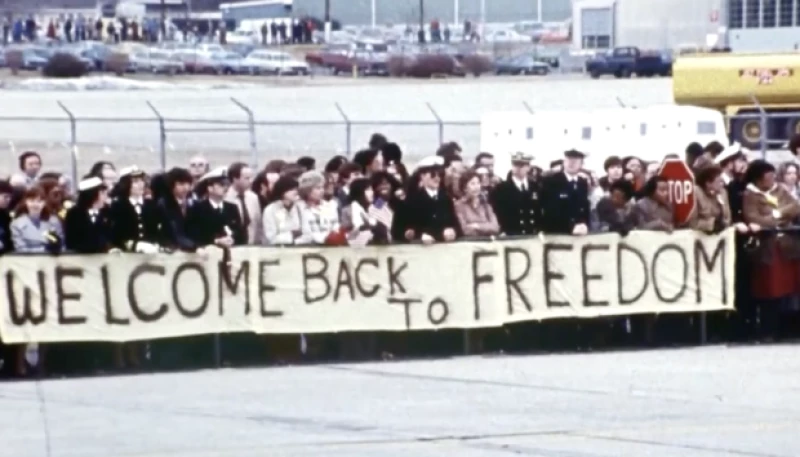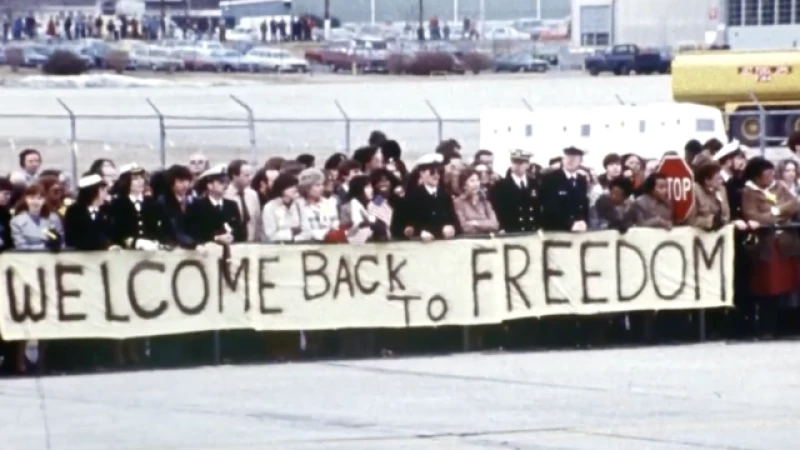On this day in 1981, the hostage crisis in Tehran came to an end. The crisis began in 1979 when Iranians took over the U.S. Embassy and held 52 Americans hostage for over 444 days. However, the end of the crisis did not mark the end of the suffering for the hostages and their families.
The Iranians stormed the U.S. Embassy in anger over the U.S. providing medical sanctuary to the deposed shah of Iran. In the chaos before the embassy fell, consul general Richard Morefield managed to help five Americans escape. They sought refuge in the Canadian embassy. Their daring escape from Iran was later depicted in the 2012 film "Argo".
Morefield himself was eventually captured after leading six more Americans onto nearby streets, only to be cut off by an angry mob.
Meanwhile, back in San Diego, Dotty Morefield, Richard's wife, tirelessly worked to keep the pressure on for the release of the hostages. Even when her visits with top State Department officials left her disappointed, she remained determined, taking it "one day at a time," as she told CBS News at the time.
Hostage Crisis and Decades-Long Battle for Compensation
On Jan. 20, 1981, when the hostage crisis finally came to an end and the hostages were brought to Germany for family reunions, Dotty Morefield was waiting for her husband with their son, Steven.
"When he came out, the psychiatrist that examined him told him he should be ready to accept the fact he'll probably be divorced in a year because, he said, your wife has turned into a very strong person,'" Dotty Morefield recalled. "And Dick just laughed at him. He says 'You don't know my wife, do you?' And he walked out of the room."
After getting home, the Morefields celebrated, but what they didn't know was that the end of the hostage crisis was just the beginning of a decades-long battle with their own government to get compensation for what they endured.
The Justice for United States Victims of State Sponsored Terrorism Act, passed in 2015, provided $4.4 million to each hostage or their heirs, and $600,000 to families. The money came from fines and seizures against companies illegally doing business with Iran. However, less than a quarter of the money was paid, because 9/11 families were later added in and the fund was depleted, even though Iran was not implicated in the 9/11 attacks.
"I feel they've betrayed us. I feel they have neglected us. I feel they have mistreated us," Dotty Morefield said.
Attorney Fights for Compensation for Former Hostages
For nearly two decades, an attorney named Tom Lankford has been tirelessly advocating for the former hostages who were held captive in Iran. Lankford has been trying to secure compensation for these individuals, but has faced numerous challenges along the way.
"We should have been fully paid by now, and that would have enabled hostages to do a lot of special things that they wanted to do, provide education to their children or grandchildren, take that one glorious trip they'd always wanted to take," expressed Lankford. "And they haven't been able to do it. And it's broken my heart."
Lankford believes that the compensation would have made a significant difference in the lives of the hostages and their families, even long after the initial media attention and celebrations had faded away.
"You have to understand that they were kept in the horrible political prison in Iran, that they were, many of them were housed right across from the torture room where Iranians, military and others, were being put to death through water houses stuck down their throat or choked through various means," Lankford explained. "And they could hear that all. And they were told 'Tomorrow's your day.' So every time the jail cell opened, they thought 'This is the last sound I'm ever going to hear.'"

The Lasting Impact of the Hostage Crisis on Families
The recent hostage crisis not only took a toll on the hostages themselves but also had a profound impact on their families. The emotional and psychological trauma experienced by the hostages affected their loved ones in ways that are difficult to comprehend.
Steven Morefield, one of the hostages who survived the ordeal, reflected on his childhood growing up with the constant fear and uncertainty caused by the crisis. "Somebody once asked me, how is it different growing up with this in your childhood? And it's like, well, I don't know, because I don't have another childhood to compare it to," he said.
Dotty Morefield, the wife of a former hostage, shared how her husband struggled with the trauma for the rest of his life. Despite returning to work at the State Department, he was never the same. "It changed his life. It shortened his life," Dotty Morefield revealed. "He couldn't be in a room with a door closed. I've been in hotel rooms where I found him asleep on the floor. He's got towels laid out so he could track the door. All of these things - I mean, we laugh, it can be funny - but it wasn't funny for him. It was panic."
Compensation for the families affected by the crisis could have provided some solace and acknowledgment of the hardships they endured. It would have been a small measure of justice for the sacrifices they made and the years they spent without their loved ones.
Dotty Morefield Honored for Her Volunteer Work at Boucheron Mystery Writers Conferences
Dotty Morefield, a resident of an assisted living facility, continues to stay active and make a difference in her community. Despite her age, Morefield volunteers at the Boucheron Mystery Writers Conferences, where she has been recognized for her dedication and passion.
In fact, the conference has even created an award in her honor to celebrate volunteers like her. This award serves as a testament to Morefield's commitment to making a positive impact and her selflessness in giving back to others.
In addition to her volunteer work, Morefield is also fighting for justice for her late husband, who was a victim of a hostage crisis. She believes that seeking justice is not about personal gain or material possessions, but about ensuring that those responsible are held accountable.
"I've had a good life. Steven has had a good life," Morefield said. "But that money represents justice. It doesn't represent trips or buying things or any of that. It represents justice."







